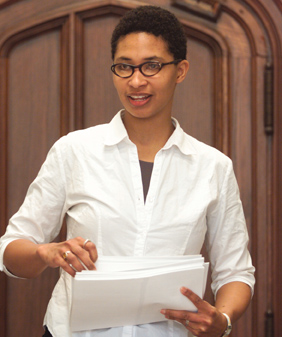|
Web Exclusives:Features December
19, 2001: After her freshman year, Danielle Allen '93 had to drop of out the Princeton track-and-field program because of knee problems. Looking back, she says, the injury was actually an enormous blessing. With more time to devote to academics, Allen began a career as a classicist that in October landed her a celebrated MacArthur "genius grant" — at the tender age of 29. Winners of the $500,000, no-strings-attached grants are chosen for "exceptional creativity" and "promise for important future advances based on a track record of significant accomplishment." Every year, a mix of scholars, artists, activists, and other achievers are nominated, vetted, and selected in a secret, two-year process. Allen says she still has no idea who brought her to the committee's attention. "Everyone I've asked so far has denied it," Allen says. Currently, Allen is an associate professor at the University of Chicago, with appointments in the departments of classics and political science as well as in an interdisciplinary program on social thought. In 2000, Princeton University Press published her book, The World of Prometheus: The Politics of Punishing in Democratic Athens. (When asked what she might do with the money, she responded with "Buy many thank you notes, a dog, and time to write.") Allen's rise in academia was remarkably rapid, due to an unusual confluence of factors. The daughter of a political scientist and a rare-books librarian in Claremont, California, Allen majored in classics at Princeton. She had studied Latin in elementary school, but it wasn't until learning Greek as a Princeton student that she decided to make a career of it. "I adore the Greek language," she says. "With Greek, there was something about the sound of it that captivated me." Princeton professors Thomas Roche *tk and Josh Ober were among those who helped instill her with a desire to teach. After graduating from Princeton, Allen attended Kings College, Cambridge, as a Marshall Scholar. Allen not only loved her time in England, but she also came away with a PhD in classics after only three years, largely because she was able to "hit the ground running" by expanding her Princeton thesis — about politics in ancient Athens — into a dissertation. In 1996, Allen enrolled at Harvard to earn her second PhD, this time in political theory. Allen says she didn't enjoy her time at Harvard — a combination of nostalgia for Cambridge and a less-welcoming intellectual environment, she says. After a year and a half, she left for Chicago, where she was hired as an assistant professor at 25. The market for classics professors, she says, is actually stronger than one might imagine. "There's more demand than there are people," she says. This year, she's teaching four courses: a survey on Greek poetry, a course about funeral orations, a course on ancient and medieval political thought, and a seminar on the American novelist Ralph Ellison. Ellison, along with Aristotle and Thomas Hobbes, will feature prominently in Allen's next book. In her first book, The World of Prometheus, Allen zeroed in on the role of anger in crime and punishment. In ancient Athens, for instance, husbands who caught their wife's lover in the act were permitted to kill the adulterer; if the adulterer was instead brought to trial, the wronged husband was allowed to physically abuse the adulterer in sight of the jury. Such practices, of course, would never stand in contemporary America — yet to Allen they illustrated the value that Athenians placed on the expression of anger in the sphere of jurisprudence. American law, by contrast, requires judges to insist that juries abide by the precepts of the law, not by what they personally believe to be the fairest or most just response. "For me, studying anger in Athens was an eye-opener about our contemporary justice system," she says. "We tend to have pretty tongue-tied conversations about punishment. We won't admit how important anger is, so we often can't resolve it in ways that aren't violent." Allen is intrigued by experiments in Australia that have brought together perpetrators of crimes and their victims, each flanked by their families. Perpetrators are given the chance to apologize, while the victim is allowed to air their anger about the crime. Allen sees such efforts as a way to use the justice system to heal the community's scars. "I'm not so sure I feel comfortable saying it should be done in cases of rape and murder, but I see it as a promising idea," she says. In addition to watching movies — her favorites include Chinatown, Vertigo and O Brother, Where Art Thou? — Allen spends her off-hours teaching in the Odyssey Project, a year-long course sponsored by the Illinois Humanities Council that prepares poor Chicagoans up to age 35 for reentry into the educational system. Participants attend the course free of charge, and they also receive child care, transportation, and books. This year Allen is teaching Odyssey students about American history. She says that the experience has been a welcome counterpoint to the classes she teaches at the University of Chicago. "The Odyssey students are invigorating," she says. "I've learned more from teaching them than I have from teaching any other students. They're very motivated, and also completely frank in a way I find that university undergrads are not. They don't have the same competitiveness, so they will admit it if they're confused, and they don't hide their opinions. It gave me back a certain frankness in the teaching process." By Louis Jacobson '92 Louis Jacobson '92 is a staff correspondent at National Journal magazine in Washington.
|

 By
Louis Jacobson '92
By
Louis Jacobson '92